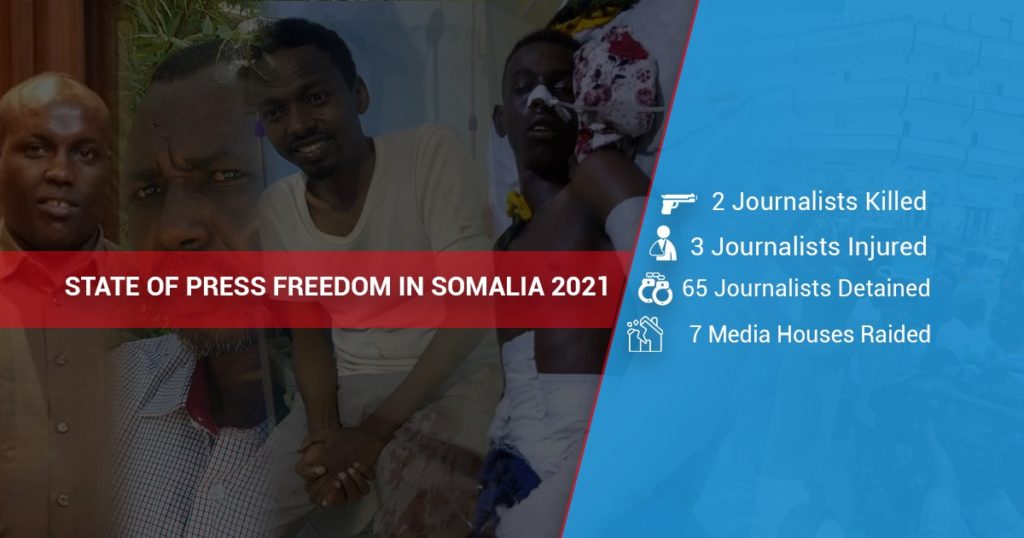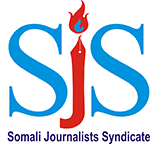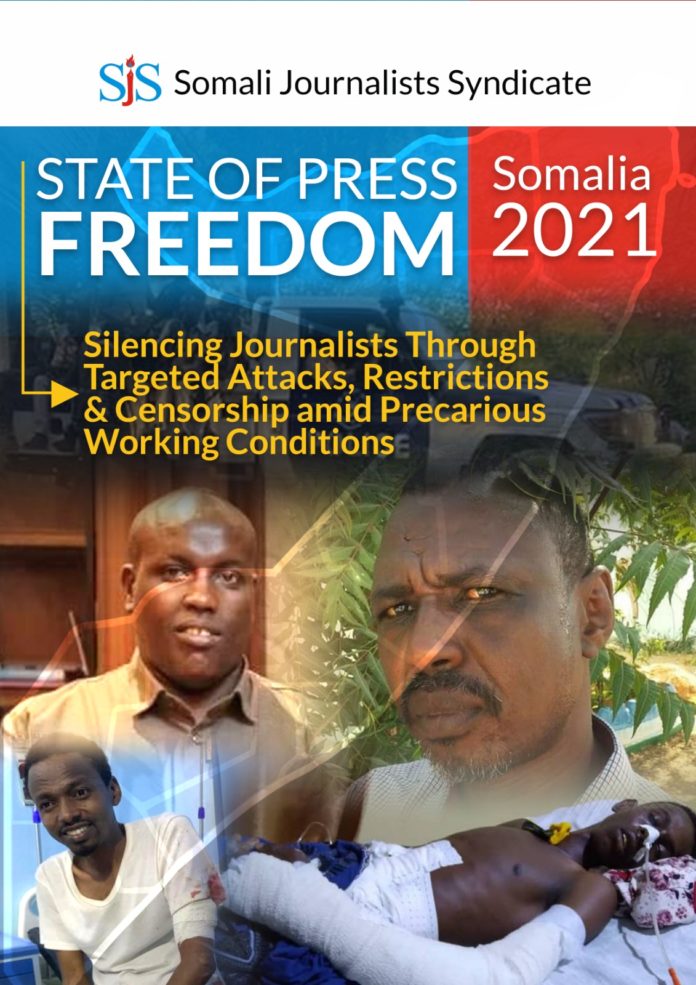MOGADISHU, Somalia, 10 January, 2022 – Somali journalists were once again subjected to violence and deliberate attacks by the security forces of the federal government, regional states and the militant group al-Shabaab. Covering insecurity, the continued deadlock in federal elections and the reports concerning allegations of human rights violations, power abuse and corruption within the government are key red line for media professionals in Somalia. Journalists seeking to cover these issues often face arbitrary detention, death threat, harassment and intimidation and many are forced to self-censor themselves. As the country is still in a critical transition period as of the end of 2021, the problems have increased even more.
Journalists are taking increased risks throughout Somalia including Somaliland. Various forms of violence against journalists have increased significantly during 2021: from physical attacks to intimidation and harassment, targeted cyberbullying, we now see a number of tactics used to silence critical voices and freedom of speech. Together with the prevailing culture of impunity for perpetrators of crimes against journalists, this is one of the most serious challenges facing media freedom in Somalia. Sadly, self-censorship or quitting the profession has now become the only survival option for journalists in Somalia.

Two journalists were murdered in the country in 2021 and three others sustained serious injuries – two of them with gunshots. 65 journalists were arbitrarily detained and seven media houses raided. Majority of these violations were perpetrated by state security forces such as the National Intelligence and Security Agency (NISA), Turkish-trained Haramcad Police, security officers of the regional states of Puntland, Galmudug, South West and HirShabelle. Attacks on free press rose up in Somaliland where 12 journalists were arbitrarily arrested over the course of the year. Al-Shabaab has taken credit of the death of the two murdered journalists in Galkayo and Mogadishu, while government security forces shot and wounded two journalists on duty.
Threats and attacks from government officials, private individuals and al-Shabaab are almost a daily occurrence. Somalia still maintains its unenviable title of being among the most dangerous countries to practice journalism globally. For the seventh year in a row, Somalia has maintained the ignominious world title for impunity towards crimes against journalists as journalists’ killers roam free.
Journalists’ access to information is extremely limited across the country. In 2021, while the impact of Covid19 continues to plague the Somali community, journalists found it difficult to obtain information about the government’s response on the pandemic and the vaccine. The denial of journalists’ access to information by federal and state health authorities, in violation of national and international legal obligations, thwarted public efforts to save lives and to reduce the spread of misinformation and fake news hindering vaccine uptake in the country.
Local media editors, reporters and producers revealed how the Federal Ministry of Health enforced secrecy to limit criticism of poor decision-making or hide corruption allegations as the pandemic took hold in all corners of the country. In many instances, both federal and regional states have deliberately blocked, detained, harassed and threatened journalists covering elections – especially during disputes and complaints related to Upper House and Lower House election.
Throughout the year, the federal police in Mogadishu denied journalists access to information relating to the disappearance of Ikran Tahlil Farah, an intelligence employee who went missing late June 2021, and to information concerning the young Somali recruits allegedly transferred to Eritrean training camps as numerous public protests demanding information about their whereabouts were repeatedly dispersed.
Precarious working conditions, low wages, lack of employment contracts and lack of occupational health and safety continue to affect Somali media workers. Since the start of the epidemic in the country, media workers have been particularly vulnerable and many journalists have been infected with the infection, although no deaths have been reported. Somalia does not have a statutory minimum wage and a new federal labor law, which could spell out labor rights and conditions of employment, is still in draft.
Somali Journalists Syndicate (SJS) calls on the federal and regional states of Somalia to respect the right to freedom of the press as outlined in the Provisional Federal Constitution. Protecting journalists and media freedom is an important pillar in cherishing information as a public good.
Free press plays a vital role in informing citizens about public affairs and monitoring the actions of government at all levels. When journalists are threatened, attacked, detained and their media houses raided that means citizens will not have the right to raise key issues affecting state-building and rule of law, which are important for Somalia’s governance.
SJS further reminds Somali federal and regional authorities about their obligations to ensure that thorough and objective investigations are made of all cases of journalist killings, including the murder of the cameraman, Abdirizak Kasim Iman, who was shot dead by a police officer in July 2018 in Mogadishu.
The report presented here is based on interviews with local journalists, media directors, family members of affected journalists, civil society representatives and government officials. It covers violations against the journalists and the freedom of the press including threats, harassment, arrests, censorship, physical attacks and killings of journalists in Somalia including Somaliland that took place from 1 January to 31 December, 2021.
Abdalle Ahmed Mumin,
Secretary General, Somali Journalists Syndicate


